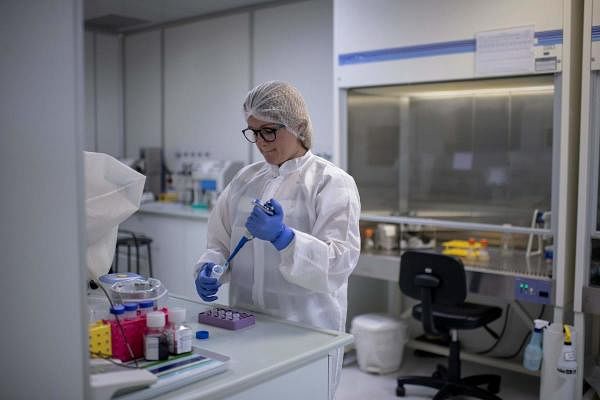
The Supreme Court’s interim order on Wednesday that private laboratories should provide tests for COVID-19 free of charge has sparked off much outrage – and rightly so. The price of these tests in private labs was already capped at Rs 4,500 (it was free in government labs); insisting that they should be free is uncalled for. Private laboratories cannot afford to do this and, far from helping the cause, it will only end up harming it as labs may simply not be able to cope. It will, quite simply, act as a disincentive.
But it’s not just about the Supreme Court alone. The COVID-19 outbreak has once again brought to the fore the Indian State’s penchant to interfere in markets that are always lurking just under the surface, eagerly waiting for the next crisis.
In mid-March, when a huge spike in the demand for masks and hand sanitisers led to a shortage, both the Essential Commodities Act (ECA) and the Legal Metrology Act were invoked – the former to ensure there is no hoarding and the latter to put a lid on prices. Neither of these moves would have facilitated or incentivised a ramping up of production that was most needed at that point of time. On April 8, the Union Home Secretary asked state governments to take recourse to the ECA to ensure the availability of essential commodities. Sure, some hoarding will be unearthed and cases slapped against a few traders but there is enough evidence from earlier instances that the negative fallout will far outstrip the few gains such actions will yield.
At a time when state capacity is under severe stress and when much of the shortage is because of transit disruptions, bringing in draconian measures like this will only unleash inspector raj, something India definitely does not need at this point. Far better to intelligently ease curbs and provide logistics support to the movement of essential goods. That will make hoarding unviable – a far more effective way of killing it. Unfortunately, such measures make politicians feel good and get support across the political spectrum.
The Big State returns?
Dare one hope that these are short-term measures that will be rolled back once the crisis is over? Congress leader Jairam Ramesh said in an interview that the 1991 reform rolled back the state because that was the need of the hour but now the state may well have to re-enter because this is the need of the hour. Such ideas tend to go viral faster than the COVID-19. Indeed, this nostalgia for the Big State is a post-COVID-19 phenomenon across the world. The Narendra Modi government has exhibited its socialist predilections time and again and something like this could well appeal to it. The minimum government promise was not quite what it was made to be; COVID-19 may well end up killing it altogether.
The fulsome praise for the undoubtedly stellar role played in the crisis by the Food Corporation of India and Air India is worrying. There’s a real danger that this could lead to the permanent shelving of any plans to restructure the former and privatise the latter. No one will question whether these two highly inefficient organisations should be guzzling taxpayers’ money during normal times just because they rise to the occasion during Black Swan events. No one will ask if there is another way of achieving the same objectives.
Reduce regulatory burden on businesses
The state certainly has a role to play in mitigating the impact of large disasters of the scale we are currently seeing. Assisting the poor and vulnerable sections with cash transfers and ensuring they have access to food is quite acceptable. Businesses – big and small – also need assistance, but should it take the form of bail outs (the sums being sought are staggering) or an easing of sundry compliances, especially those relating to the payment of taxes? These questions need to be asked now.
Small and medium enterprises (SMEs) are particularly hit and will need a lot of support. But the biggest bugbear of the SME sector is regulatory cholesterol and inspector raj, from both the central, state and local governments. Take for example their access to credit. It is blocked largely because of unreasonable conditions regarding collateral and other paperwork. Would it not be far better to drastically overhaul the regulatory regime for these businesses? Giving them fiscal sops may not mean much if the associated paperwork proves extremely cumbersome.
Similarly, street vendors and hawkers (who will be eligible for some cash transfers) will benefit enormously from state and local governments getting off their backs. Apart from doles, these governments should make serious efforts to implement the Street Vendors Act, 2014, and stop harassment by municipal authorities and the police.
Large businesses also suffer from regulatory excesses; let’s not forget the provisions related to corporate social responsibility, the anti-profiteering law and tax terrorism, to name just three of the most egregious ones. Why not go over the regulatory burden of each sector and drastically reduce – if not altogether eliminate – them? These might do more for the health of those sectors than fiscally unsustainable sops.
What COVID-19 has highlighted once again is the abysmal levels of state capacity in India – especially in welfare-related functions. State expenditure and governance capacity should be concentrated on public health and providing a safety net to the vulnerable, not frittered away in meddling in prices and other business operations. The pandemic is going to change the ways of the world in many ways – why not the role of the Indian State and the way it engages with businesses?
(The writer is a senior journalist and author. She tweets at @soorpanakha)
The views expressed above are the author’s own. They do not necessarily reflect the views of DH.